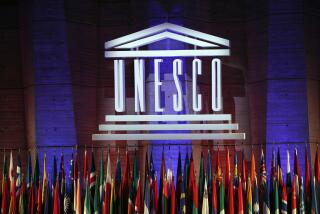A U.S.-U.N. Reconciliation Path
- Share via
After months of often heated haggling, the U.N. General Assembly has accepted Washington’s demand for a reduction of its annual dues. This largely upholds the United Nations’ end of a bargain under which Washington has agreed to pay some $920 million in past dues and which should pave the way for friendlier relations between the U.N. and Washington. The United States didn’t get all it wanted--its contribution to peacekeeping operations was cut from 30% to 27% instead of the desired 25%--but the concessions are substantial and should be accepted both by Congress and the incoming Bush administration.
It was not the most elegant way for the United States to force the bloated U.N. to revamp its administration and reorganize peacekeeping operations. Hostility to the world body emanating from GOP lawmakers has created friction with U.S. allies, while the refusal to pay dues on time has created huge administrative headaches. But, just as Britain’s then-Prime Minister Margaret Thatcher, shouting “I want my money back,” forced the European Union to revamp its budget in the early 1980s, the hectoring from Washington was useful.
In addition to reducing the U.S. dues from 25% to 22% of the United Nations’ annual administrative budget--a reduction that amounts to $34 million in annual savings to taxpayers--the U.N. changed its assessment formula, raising dues from countries that have grown richer, including South Korea and Singapore, and cutting assessments for countries experiencing problems, such as South Africa. It will carry out another reassessment in three years.
Streamlining its bureaucracy, the U.N. was able to hold its budget to nominal growth and embark on an overhaul of its peacekeeping operations. The U.N. still has a way to go. For example, its 800-employee public information office is twice as big as its entire peacekeeping coordination office.
Much of the credit for the settlement goes to U.N. Ambassador Richard C. Holbrooke, who devoted much of his 16-month U.N. tenure to clinching the deal, and to media executive Ted Turner, who agreed to pay the $34-million difference between the old and new assessment for the transition year. Turner is already the U.N.’s most generous friend, having pledged $1 billion over 10 years to help finance its humanitarian operations.
The Senate, whose leaders were consulted throughout the negotiation, should have no reservations in approving the deal, even though it falls somewhat short of its demands. Its acceptance by the administration of George W. Bush would, after years of antagonism, set the U.S.-U.N. relationship on the right footing.
More to Read
Sign up for Essential California
The most important California stories and recommendations in your inbox every morning.
You may occasionally receive promotional content from the Los Angeles Times.










